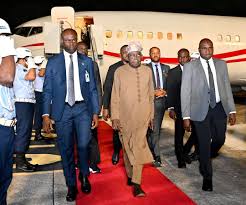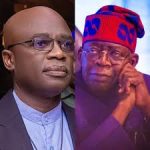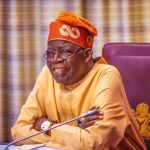
From St. Lucia to Brazil — Tinubu Abroad While Nigeria Bleeds

President Bola Tinubu has come under mounting criticism for embarking on back-to-back international trips, even as Nigeria continues to deal with relentless violence, mass killings, and deepening insecurity. In just over a week, Tinubu has visited St. Lucia to attend a state event, taken a few days of vacation, and is now in Brazil, where he is participating in the BRICS Summit and holding high-level meetings with leaders, including Brazilian President Luiz Inácio Lula da Silva.
In Rio de Janeiro, Tinubu praised the “warm and productive” talks with Lula, highlighting plans to deepen cooperation in agriculture, energy, oil and gas, mining, and industrial development. He emphasised the shared leadership role of Nigeria and Brazil in shaping a “more balanced, equitable, and dignified global future.”
But back home, the ‘future’ looks anything but dignified for many Nigerians. The country has witnessed a series of devastating attacks in recent weeks, with many killed across Sokoto, Plateau, Zamfara, Kaduna, and Benue states, and communities displaced by unchecked violence from armed groups and bandits. Reports warn of worsening conditions in internally displaced persons (IDP) camps and rising food insecurity, especially in the North.
Citizens are increasingly furious over what they describe as Tinubu’s absence and aloofness, as he continues to traverse the globe while Nigerians mourn their dead. His visit to St. Lucia, a Caribbean island with a population of under 200,000, for a ceremonial event marking Emancipation Day was already controversial.
Why did the Nigerian president need to attend a symbolic foreign celebration while his own country faced one of its deadliest security crises in decades?
Now, the trip to Brazil has further inflamed public anger. From St. Lucia to Rio, Tinubu is acting like a statesman without a state. While he smiles at summits, villages are being wiped out at home.
The president’s diplomatic outreach may hold long-term economic potential, but the immediate threat to Nigeria’s territorial integrity and civilian lives cannot be solved abroad. The military remains underfunded, local policing is weak, and few attackers are ever prosecuted.
The Tinubu administration has defended the trips as necessary for re-establishing Nigeria’s international presence and attracting investment. Presidential aides insist the president remains fully briefed on security matters and continues to direct actions remotely. But that defence is wearing thin.
For many Nigerians, what matters now is leadership at home, not visibility abroad. As funerals multiply and fear grows in rural and urban communities alike, the gap between Nigeria’s official diplomacy and its lived reality has never felt wider.
Read More:
- Outrage as Benue Governor Joins Tinubu in Brazil Despite Recent Massacre Crisis and Insecurity
- Sanctuaries or Stages? How Politicians Are Hijacking Nigeria’s Religious Spaces
About The Author
Related Articles
Asake Sets New Billboard Afrobeats Record as Chart Presence Grows
Asake has further cemented his place as one of Afrobeats’ most dominant...
ByWest Africa WeeklyJanuary 29, 2026Nigerians Lament PayPal’s Return as Old Wounds Resurface
PayPal’s reentry into Nigeria through a partnership with local fintech company Paga...
ByWest Africa WeeklyJanuary 29, 2026Tanzania Eyes Gold Sales as Aid Declines and Infrastructure Needs Grow
Tanzania is weighing plans to sell part of its gold reserves to...
ByWest Africa WeeklyJanuary 29, 2026Mali Tightens Grip on Explosives Supply With New Majority Stake
The Malian government has taken majority ownership of a civil explosives manufacturing...
ByWest Africa WeeklyJanuary 29, 2026












Leave a comment